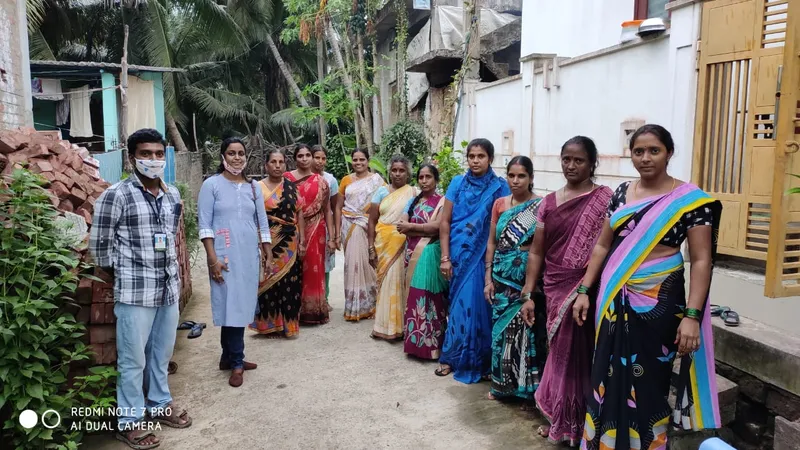How this baby food startup ensured employment for rural women amidst the pandemic
Jyothi Pappu, the Founder of organic food startup Nutreat, speaks about helping women in villages gain financial independence and growing her women-centric brand amidst the COVID-19 pandemic.
It was 2015. Jyothi Pappu – like every new mother – was fretting about what to feed her son. The baby foods available in the market did not make the cut as not one brand was natural and preservative-free.
This quest for healthy baby food led her to turn to her grandmother, who shared her repository of knowledge but insisted that Jyothi only use traditional methods to prepare the food, which meant stone grinders!
Jyoti, who had done a master’s course in pharmacy from Sri Ramachandra University, Chennai, went on to do more research, consult friends and paediatricians, and experiment in her kitchen.

In 2015, she launched Nutreat, a baby food startup that makes products using age-old recipes. Starting with two recipes, Nutreat now offers more than 20 recipes for babies, 10+ recipes for children, and others for people of different age groups. It also offers more than 60 recipes that are protein-rich, immunity-boosting, and ensure complete family health.
All products are made only after orders are received, and have no preservatives and artificial ingredients. The Andhra-Pradesh based startup has garnered over 5,000 customers in a year from India and other countries.
The pandemic effect
Things were picking up pace for the startup when the pandemic hit in 2020. “While many other food industries were closed and reduced their staff etc, we worked harder during this pandemic and hired many more rural women with the help of Smart Village Movement Team,” Jyothi says.
The team trains the women on financial independence as well as the importance of creating quality products.
These women, who used to earn their living by working at cashew factories (Mori), weaving (Goodapally) etc. had lost their income due to pandemic and were out of work for about two to three months. The team soon realised that many women in and around Malikipuram lost their daily wages during the pandemic.
"So we collaborated with Team SVM and with their resources we were able to hire more rural women; we called it Project Sanative. It is an initiative to restore potential opportunities in rural areas with modern knowledge,” Jyothi says.
All of Nutreat products are handcrafted and need human intervention at many levels, from procuring to packing the final product.
Getting started
However, the journey wasn't a cakewalk. Jyothi says rural women were not quite ready to work, as they had to hand-pound and stone-grind the ingredients.
“Amid the pandemic, they were not sure how logistics would be operated smoothly. I decided to motivate rural women about the situation and how easily they could earn while working at home. It was a 30-day motivational programme carried out with the help of Team SVM. We went to different villages around Malikipuram - Mori, Lakkavaram, Kadali etc. and trained them,” she says.
Jyothi adds that women in villages were finally convinced that they didn’t need to step out of their house and could earn more than Rs 500 per day based on their capacity. Soon, most rural women who had lost their daily wages were part of Nutreat, courtesy Project Sanative.
Speaking about the Nutreat journey, Jyothi says, “Initially started with two recipes - one for babies and other diabetic-friendly - we found great response from local markets. We were on Amazon in two years. In 2017, the thought of introducing traditional processing methods introduced Nutreat to several customers across India.”
Nutreat has a dedicated team that works to procure the best crop for their recipes. For example, organic rice is obtained from Konaseema and toor dal from Prakasham district of Andhra Pradesh, ragi from Karnataka, and black rice from Assam.
“We take pride in our procurement as we don't buy commodities from dealers or distributors; we buy crops directly from farmers, supporting them with fair prices.”
How does it work?
Through Project Sanative, women are allowed to work with Nutreat to handcraft the flours, rava, and more, irrespective of qualifications. The startup provides training for a period of 15-18 days and furnishes them with essential raw material. They need to clean the ingredients and handcraft as per instructions.

“We do a quality check in our kitchen and pay accordingly. Every five women work with one co-ordinator who takes care of all activities at the ground level. All these activities, except final packing, are completed virtually with help of video monitoring by the co-ordinator,” Jyothi says.
Nutreat now has five such groups in villages like Malkipuram, Kadali, Lakkavaram etc. now. Apart from rural women and farmers, they also collaborate with local women potters who supply utensils on order.
“Through this project we buy crops from farmers who grow organic and natural through Zero Budget Natural Farming. We have launched a handcrafted grocery range as well. Rural women are mainly given handcrafting tasks related to staples like toor dal, moong dal, flours, rava etc,” Jyothi explains.
In the last eight months, the team has handcrafted almost 4,000+ kg of ingredients, especially wheat, buck wheat, besan, rice rava etc. Each recipe pays differently; the rate for spice powders is high as compared to flours. Women earn between Rs 550 and Rs 1,500 per day, depending on their strength and ability to work.
“Whenever a woman wants to earn, she can simply visit our kitchen, get raw material, work on it as per instructions, give it back to us, and receive payment.”
Future plans
Jyothi says Nutreat is a women-centric brand that employs rural women and youth, who are mostly illiterate but skilled and enthusiastic to learn and work. The team is now aiming to explore villages in Krishna, Guntur, and Prakasham districts in AP, and a few in Karnataka by the end of this year.
Nutreat is also conducting a restoration programme to retreive 100 lost traditional recipes of India – this will focus on learning 100 traditional recipes from different states that "kept our ancestors healthy and alive for more than 100 years""
The team is already conducting a survey with the help of their customers and universities in different states.
“Once we are able to get proper funding, we will expand to states in North India as well. By the end of 2022, our goal is to handcraft 20,000 kg of food and empower at least 100 rural women.
"Till now, we have been collaborated with five natural farmers from Andhra Pradesh and two from Karnataka. By 2022, we want this number to be five from each district of Andhra and Karnataka,” Jyothi says.
Edited by Teja Lele












